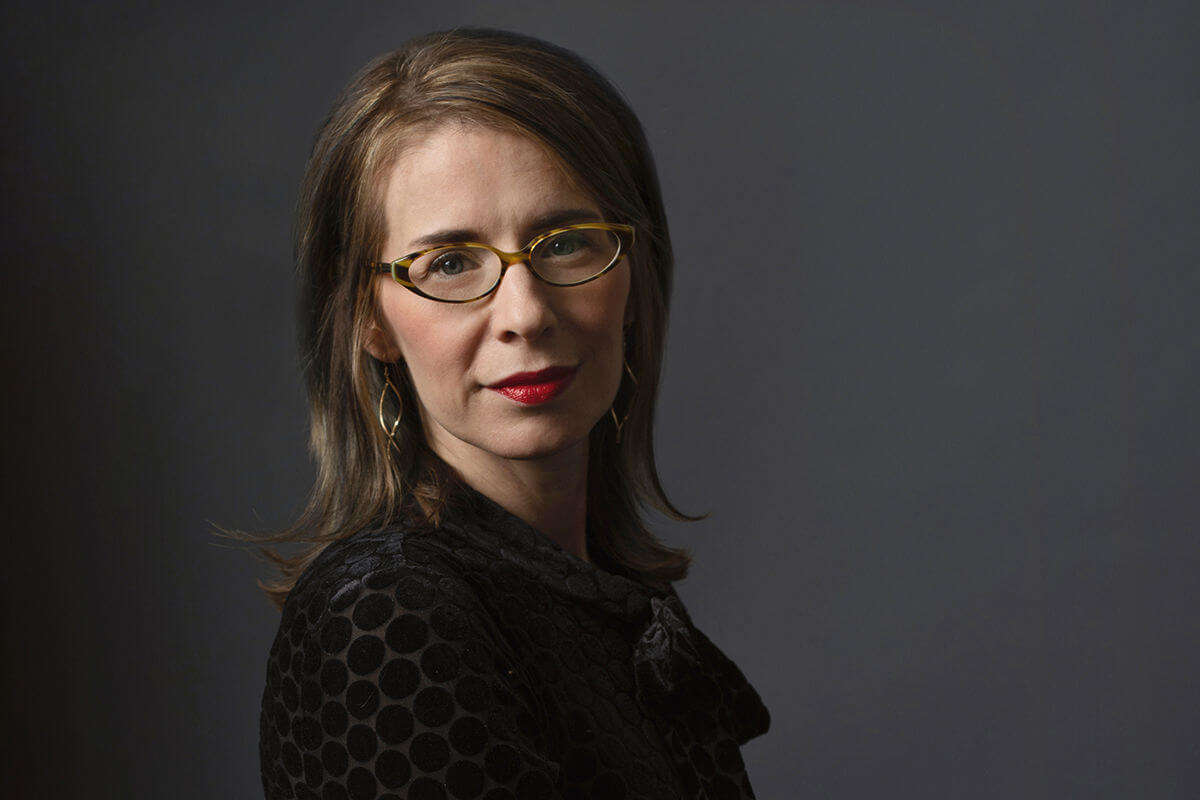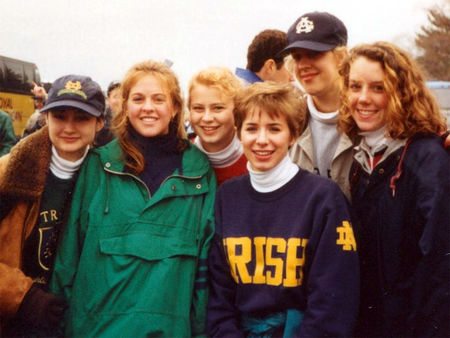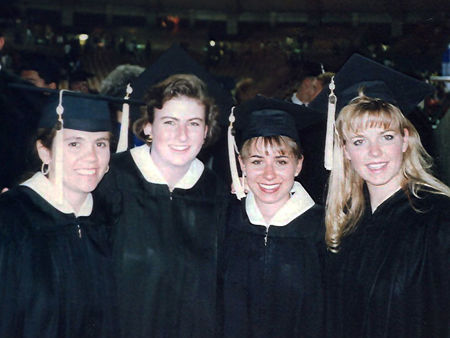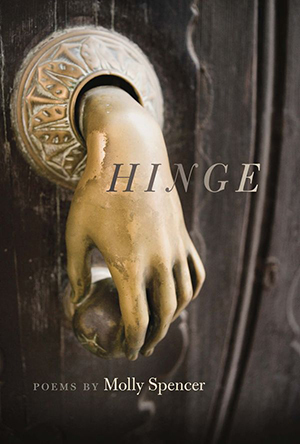
Molly Spencer ’94 knows how much words matter.
As a writing instructor in the University of Michigan’s Gerald R. Ford School of Public Policy and and the author of two books of poetry, she appreciates the connotation, the shades of meaning, the nuance in every word.
“People often ask me how it is that I teach policy writing and write poetry because they seem like such opposite pursuits. But I feel that they’re actually very closely aligned — policy practitioners and poets all care so deeply about the world,” Spencer said. “And as in poetry, in policy work it’s important to get the words just right because of the way policy shapes our society and our everyday lives.”
Spencer, who majored in economics, said one of the things she enjoys most about teaching is helping her policy students understand how simply changing a few words can make a big difference.
“I love helping my students translate the very technical language of policy research and data analysis into writing that is digestible instead of off-putting and engaging rather than distant,” she said.
It is a skill set she learned as an undergraduate in Arts & Letters — and one that has served her well throughout her career in public policy, writing, and teaching.
“One of the greatest gifts of my liberal arts degree was the training to think critically — and to translate that into good writing,” she said. “And being a good writer has helped in every single one of my jobs. I also believe that the historical perspective I gained by studying literature and history alongside my economics courses gave me a much richer perspective that shaped how I thought about my work in the public sector, and of course now it informs my teaching.
“Having that multidisciplinary foundation taught me to put things in the context of history, cultures, and schools of thought.”
A more human major

Spencer has always loved writing and came to Notre Dame intending to major in English, but her father encouraged her to choose a more business-focused major. She decided on economics — and was surprised by how much she loved it.
“Part of what I loved about economics was that it worked in the real world,” Spencer said. “It wasn’t just studying for studying’s sake — we could take what we learned in our econ courses and make the world better with it.”
Spencer, whose parents are public school educators, began to see clear connections between what she was learning in her economics classes and the struggles of her hometown community and schools.
“I grew up in a farming community in the ’80s when many people were extremely poor and losing the farms that had been in their families for generations,” she said. “And I saw the people from my hometown in our class discussions about the poverty line and safety net programs. When I found a pocket of the economics department that was oriented toward public policy, I felt right at home thinking about things like solutions to poverty and sound education finance policy because I could see how they might apply to the real world.”
Spencer also appreciated the holistic approach to the discipline she credits to the department being housed in Arts & Letters.
“By the time I was done I realized, this is the kind of economics major I want — one that is nested with the humanities, the philosophers and historians and writers,” she said. “A lot of universities put the econ major in the business school, and that's a very different context for studying economics. I think the affinities that economics had with other departments in the college made it a more human major.”
“I realized, this is the kind of economics major I want — one that is nested with the humanities, the philosophers and historians and writers. A lot of universities put the econ major in the business school, and that's a very different context. I think the affinities that economics had with other departments in the college made it a more human major.”
A formative moment

After graduation, Spencer joined Notre Dame’s Alliance for Catholic Education program, spending a year teaching first-grade Catholic school students in Louisiana — an experience that confirmed that she wanted to work in public policy.
“ACE deepened my desire and focus about what I wanted to pursue in graduate school,” she said. “I loved teaching — and I still use teaching strategies now that I learned then — but I realized I couldn’t fix any of the larger issues my kids were facing, things like structural racism or poverty, in the classroom. It helped me understand that I wanted to help people by changing systems.”
She completed a master’s of public administration at Columbia University, focused on education policy and management, and began working in large-scale public sector project management and later in legislative relations.
While Spencer enjoyed her work, she continued to write poetry and essays in her free time.
She also kept returning to a conversation she’d had with Valerie Sayers, the William R. Kenan, Jr. Professor of English, while taking a creative writing course her senior year. The week before finals, Sayers asked Spencer to come to her office hours.
“Naturally, I was terrified — but she wanted to encourage me to pursue writing,” Spencer said. “And I held that with me, all those years I was studying other things or working in other fields. I just kept hearing her voice and thinking, maybe she was right, maybe I should keep at this. It was a crucial, formative moment for me, even though it took a long time to blossom in my life.”
Years later, Spencer was staying home to raise her children when she became seriously ill. After an extended time when she was so sick she was unable to write, Spencer realized she could no longer downplay her passion.
“A few times I had tried to set the writing aside because it’s hard to be raising kids and working and trying to be a writer, too,” she said. “But when you’re sick enough to think you might die, you really prioritize the rest of your life. And I thought, if I don’t do this, then my life will not have been my life.”
Spencer rededicated herself to her writing and completed a Master of Fine Arts in poetry from the Rainier Writing Workshop in 2017. Her poems, critical writing, and essays have since appeared in numerous periodicals, and she recently published two award-winning volumes of poetry.

Her first book, If the House, was published in 2019 and her second poetry collection, Hinge, inspired by her struggles with illness, came out in fall 2020.
“When I published my first book, I sent Valerie Sayers a copy, and I tucked a letter in thanking her for that conversation we’d had and for cracking the door to my life open a little bit for me,” she said. “I actually felt very shy and didn't think she would remember me because I only studied with her for one semester. But she did. She wrote back to me with her warm congratulations, and it was a lovely, full-circle moment.”
An intentional place
In 2018, Spencer joined the faculty at the University of Michigan’s Ford School — an ideal position that allows her to pursue her passion for writing while still being immersed in the world of public policy.
“I was thrilled when I found this position,” she said. “I’m in my third year and I still sometimes look up and think, wow, who would’ve imagined. I feel very lucky.”
Looking back, Spencer doesn’t think she would be where she is now without the skills and relationships she developed at Notre Dame.
“Notre Dame is an intentional place — a place of intentional community, mission-driven teaching, and social justice,” she said. “It was a place that encouraged us to live intentional lives and I am grateful to have learned that way of living at ND.”
Spencer now encourages her own students to follow their passions — and to be open to surprises along the way.
“There’s this narrative about doing what you love no matter what,” she said. “And that’s great if it works for your life, but it doesn’t always. And that narrative would’ve kept me from studying economics. So, I say, do what you love, but be open to trying other things and maybe loving those, too.”


